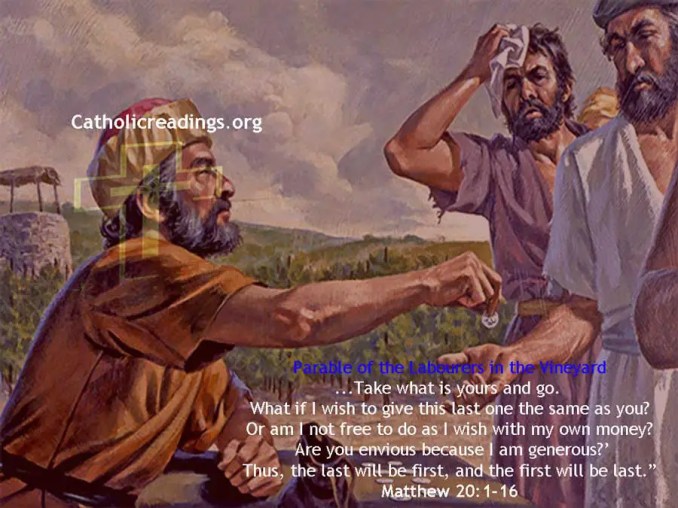The Parable of the Labourers in the Vineyard, found in Matthew 20:1-16, is a poignant allegory recounted by Jesus that invites reflection on divine generosity, human equity, and the nature of God’s Kingdom. This narrative unfolds a gripping scenario where a landowner employs laborers at various hours of the day only to pay them all equally at day’s end. Through this parable, a multitude of themes emerge, resonating deeply within the Christian experience and challenging our innate perceptions of justice and grace.
At its core, the parable addresses the intricate dynamics between labor, remuneration, and worth. The landowner, who represents God, initiates the hiring process early in the day, seeking workers for his vineyard. As the hours progress, he continually recruits more individuals, even at the eleventh hour. While it may seem efficient and just to compensate workers according to the hours expended, Jesus subverts this expectation. The workers who arrived last receive the same wage as those who had toiled the longest. This decision ignites indignation among the early arrivals, who expected to receive more based solely on their extended time in the vineyard.
This scenario epitomizes a common characteristic of human nature: the propensity to equate merit with duration or effort invested. In our society, hard work is often lauded; rewards generally reflect the amount of toil one contributes. However, the parable challenges this assumption, opening the space for a broader theological discourse regarding grace and the Kingdom of Heaven’s radical inclusivity. The landowner’s response to the complaints of the first workers is revealing: “Are you envious because I am generous?” This rhetorical inquiry provokes a deeper introspection into the human condition, revealing how jealousy and entitlement often skews our understanding of fairness.
Thematically, the parable serves as a mirror reflecting societal norms surrounding fairness and meritocracy. God’s kingdom, as illustrated by the landowner’s actions, operates under a paradigm that defies human conventions. The narrative compels us to reconsider the implications of grace. It is not divvied out based on our hour count in God’s vineyard but is freely bestowed upon all who are willing to enter. This invites a reconsideration of our own worth and that of others, fostering an attitude of humility and gratitude—qualities central to the Christian faith.
This parable captivates the imagination as it amplifies themes of equality, inclusivity, and divine sovereignty. The landowner’s decision to hire workers at different intervals signifies the boundless nature of God’s call; it does not matter when one responds to His invitation. Whether one has been laboring for decades or has merely entered the faith at life’s twilight, the promise of salvation and inclusion remains unaltered. Such a construct may elicit anxiety within those who have adhered staunchly to the belief in reward for prolonged devotion, suggesting a radical reshaping of our spiritual priorities.
Another fascinating facet of this parable is its critique of the transactional nature of human relationships. The reactions of the early workers echo a deeply ingrained belief that effort must be directly correlational to the benefits received. When the grace of God is perceived as a limited resource—only available to those who have achieved a certain ‘status’—it fractures the notion of an all-encompassing, loving God. It challenges adherents to transcend transactional dynamics and embrace relationships steeped in unconditional love.
The Parable of the Labourers in the Vineyard implores Christians to reflect on their own responses to grace. Instead of begrudging the generosity extended towards others, there exists an invitation to rejoice in the universal offer of salvation. This understanding engenders communal joy rather than competitive rivalry. In celebrating others’ blessings, a spirit of unity flourishes, which is integral to the very essence of Christ’s teachings.
Moreover, this narrative confronts the contemporary issue of societal disparity, especially in notions of worth and value as defined by productivity. The parable interrogates the hierarchy often constructed among individuals based on socioeconomic status, achievements, or church attendance, urging a reconsideration of how worth is perceived through a Christian lens. Individuals previously marginalized or despised may find hope within the ecosystem of God’s vineyard, emphasizing every person’s inherent dignity regardless of life’s circumstances.
As the parable draws to a close, it culminates in a declaration about the last being first and the first last. This paradoxical statement serves as an encapsulating principle of the Kingdom of Heaven. It ingeniously flips standard societal hierarchies upside down, reminding believers that God’s grace operates on principles that often contradict human understanding. The true essence of the Gospel invites all into a shared experience of divine love, where no one is excluded based on perceived merit.
In summation, the Parable of the Labourers in the Vineyard stands as a timeless narrative steeped in complexity. It resonates deeply with contemporary observations of justice and equity while hinting at profound theological truths. This parable invites Christians to a heart of generosity, empathy, and gratitude, reminding us that we are all equal recipients of God’s bountiful grace. Embracing the radical inclusivity of this narrative can transform how we perceive ourselves and others, allowing the vineyard of God to be a haven for all who seek to labor in His presence, regardless of when they arrive.



